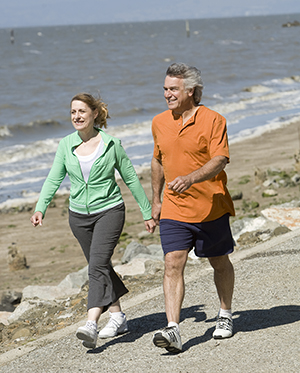A
B
C
D
E
F
G
H
I
J
K
L
M
N
O
P
Q
R
S
T
U
V
W
X
Y
Z
Click a letter to see a list of conditions beginning with that letter.
Click 'Topic Index' to return to the index for the current topic.
Click 'Library Index' to return to the listing of all topics.
Coping with Perimenopause
For most women, the symptoms of perimenopause subside after entering menopause, although hot flashes and vaginal dryness can continue after periods have stopped. In the meantime, symptoms can be relieved to help you feel better. Leading a healthy lifestyle can keep you feeling your best. The tips below can help. Doing things you enjoy and spending time with people you love are great ways to keep your spirits up as your body goes through the changes of perimenopause.
Menstrual changes
-
What happens: As hormone levels go down, periods can become irregular and hard to predict. These changes are often the first signs of perimenopause.
-
What you can do: Keep pads or tampons on hand in case your period comes unexpectedly. You may also want to talk to your healthcare provider about taking birth control pills to help regulate your periods.
Hot flashes and night sweats
-
What happens: During a hot flash, you suddenly feel very warm. This may happen often, or just once in a while. Hot flashes at night may interrupt sleep. You may also wake up covered in sweat (night sweats).
-
What you can do: Wear layers that you can remove. Try all-cotton clothing, sheets, and blankets. At night, open your bedroom window. Keep a glass of water or small fan by your bed in case a hot flash wakes you up.
Bone changes
-
What happens: Lower levels of estrogen increase your risk of osteoporosis, a disease that weakens the bones. This can cause your bones to break more easily.
-
What you can do: Eating foods high in calcium and vitamin D helps protect your bones. Your healthcare provider may also suggest taking a calcium supplement. It's also helpful to quit smoking, if you smoke. Don't drink alcohol and get plenty of regular exercise.
Vaginal changes
-
What happens: In the absence of estrogen, the lining of the vagina can become thin and dry. This can make sex painful. Vaginal infections may also be more likely.
-
What you can do: Apply a water-based lubricant before having sex. If you are not using condoms or diaphragms for birth control, you can also use silicone-based lubricants, which don't have to be reapplied as often as water-based lubricants. Over-the-counter vaginal moisturizers can be used anytime, not just when you are having sex. You can also talk with your healthcare provider about using a vaginal cream that contains estrogen.
Mood swings
-
What happens: As hormone levels decrease, so do chemicals that affect your mood. Hot flashes and trouble sleeping can make mood swings worse. Your sex drive may also decrease.
-
What you can do: Understand that these feelings are common. Talk to your partner and to other women your age about how you’re feeling. Try exercising, which increases levels of mood-boosting chemicals in your body. If your mood swings are affecting your quality of life, talk with your healthcare provider about medicine or other options.
Stay active!
 |
| Being active in ways you enjoy can help you feel better. |
Activity can help you relax and gives you more energy. Exercise also helps keep bones and muscles strong. Staying fit may even give your sex drive a lift. Consider the following:
-
Weight-bearing activities, such as walking and jogging, help maintain bone density. This can help prevent osteoporosis.
-
Aerobic activities boost energy by moving oxygen through the body. Walking and jogging are aerobic. You might also try swimming or biking.
-
Sunlight helps raise levels of brain chemicals that boost your mood. Spending time outdoors can improve your mood, even on a cloudy day. Even a walk around the block can help!
If you’re concerned about sex
You may notice that you’re not as interested in sex as you used to be. This is very common during perimenopause. Since you’re more likely to enjoy sex when you’re comfortable, getting your symptoms under control might help. Talk to your healthcare provider about medicines or other options. And remember that there’s more to sex than intercourse. Relax and take your time. Talk to your partner about trying new things to help get you aroused.
Online Medical Reviewer:
Donna Freeborn PhD CNM FNP
Online Medical Reviewer:
Heather M Trevino BSN RNC
Online Medical Reviewer:
Irina Burd MD PhD
Date Last Reviewed:
12/1/2022
© 2000-2025 The StayWell Company, LLC. All rights reserved. This information is not intended as a substitute for professional medical care. Always follow your healthcare professional's instructions.